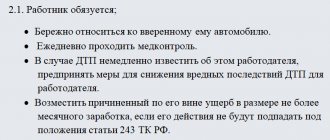Rules for drawing up a will
- the will must be drawn up in writing (Civil Code of the Russian Federation, Art. 1124);
- certified by a notary;
- the date and place where the inheritance document is certified is indicated. This does not apply to a closed type of document where witness signatures are affixed.
The conditions are strict: the testator writes an order on paper or the information is written down by dictation by a notary. The testator must sign the will himself, but if he cannot do this, the document is signed by an authorized person in a notary office (Clause 7, Article 1125 of the Civil Code of the Russian Federation). You cannot use a facsimile signature. The notary has the information and knows how to correctly draw up a will so that it cannot be challenged.
Who cannot become a witness when writing an inheritance document?
- representatives of a notary office;
- citizens included in the document as heirs;
- people who cannot read and are disabled;
- persons with mental disorders and foreigners who do not fully speak the language.
Who has the right to draw up a will for property in the Russian Federation?
- capable citizens aged 18 years and older;
- persons over 16 years of age under the following conditions: getting married, running a business, working under an employment contract;
- citizens with a residence permit, refugee certificate, foreigner's passport issued in the Russian Federation.
Rules
After the death of the testator, the direct heirs often challenge his will. Therefore, the question of how to write a will so that it is not challenged is relevant for every testator. There is a list of rules that are followed to avoid challenging the transfer of property:
- the document is drawn up by a legally competent person, medical certificates, as well as audio and video recordings are used for confirmation;
- it is allowed to involve third parties to confirm the legal capacity of the testator and to correctly indicate them in the will;
- the inheritance document is signed by the testator and only by him, witnesses are signed only when their presence is indicated in the text;
- with the exception of certain situations, notarization is required; in its absence, the document is invalid;
- it is allowed to register an inheritance for the property that the testator owns in full, without encumbrance;
- Errors should be excluded, especially in dates, names and titles of property; if the testator is illiterate, the text is written down by the notary from his words.
It is necessary to correctly draw up a will taking into account certain aspects:
- the number of heirs is not limited by law;
- an apartment, house or other real estate can be divided into shares between several heirs;
- the testator is not obliged to indicate the reasons for which he determines the heirs.
The most common reasons for challenging a document are its recognition as invalid on the basis of errors or incapacity of the testator at the time of writing. Compliance with the basic rules and consultation with a lawyer will help you draw up the document correctly and avoid disputes between heirs.
For an apartment
A will for an apartment should be drawn up taking into account the nuances of transferring real estate. A certain list of persons, according to the law, has the right to half of the real estate :
- minors or incapacitated children;
- disabled parents, guardians or spouses;
- other persons who are dependent on the testator.
These persons do not need to challenge a correctly drawn up document for real estate. Half of the apartment or house belongs to them initially.
Share in an apartment
Since the law does not limit the number of heirs to real estate, it is allowed to draw up a will for a share in an apartment. The situation suggests two options:
- the testator himself is a share owner and passes it on by inheritance;
- the testator divides the apartment into shared ownership between the heirs.
In the second case, in order to avoid disputes regarding the apartment, it is correct to indicate exactly which shares are determined for whom.
For inheritance
To make a will for an inheritance so that it is not contested, it is necessary to comply with the order and correctly indicate the property being transferred. Separate property, animals, objects - the document is drawn up indicating the correct name and distinctive features that characterize the specified property.
When filming, the specified objects can be included in the recording. It is allowed to use photographic materials to specify individual items.
For all property
A will for property transferred to one heir in its entirety is written according to a simplified procedure. The text states that all property owned by the testator at the time of death passes to the named heir.
This aspect is calculated in situations where the document is drawn up long before death and the testator cannot know what will belong to him. However, it is more correct to list the most important elements of the inheritance in a separate order - an apartment, land, other real estate or property.
For a minor child
A correctly executed written expression of will to transfer an inheritance to a minor heir is drawn up taking into account the following nuances:
- Any property can be transferred to a minor, but until the age of 18 he will not be able to dispose of it;
- the testator independently determines the executor who manages the inheritance until the heir comes of age;
- It is permissible to make a will with certain conditions.
In the absence of conditions, in some situations it is more correct to draw up a deed of gift for a minor. This step guarantees the receipt of ownership of real estate during the life of the testator and eliminates disputes after his death.
To correctly draw up a will for a minor, you should seek advice from a lawyer. Considering the situation on an individual basis will help to avoid certain troubles with the transfer of inheritance.
Contents of the will
The paper sets out the free will of the testator and his orders for the transfer of valuable property to individuals and relatives. Requirements for assigning inheritance responsibilities to legal successors are included. Persons can accept them or refuse the inheritance.
The will contains information about real estate and valuables. It describes in what shares it is divided between the legal receivers. The circle of persons is not limited by law. People to whom the testator has expressed a desire to leave part of valuable property have the right to inheritance.
Notary, witness, enforcer. How to draw up a will?
How to manage your property so as not to cause discord in the family? How to draw up a will? Svetlana Mazolevskaya, notary of the Grodno notary district, answered these and other questions.
– Drawing up a will undoubtedly has its advantages. This is a one-sided transaction of an exclusively personal nature, and can be completed by a legally capable citizen. There is no requirement to obtain the consent of the person in whose favor this document is being drawn up, or to inform anyone else about it. Drawing up a will through a representative or from several people, for example, a joint will of spouses, is not allowed. Only the testator himself must be present.
– What are the advantages of making a will?
– The testator has the right to change or cancel the document at any time without giving reasons. During his lifetime, he remains the owner of his property; nothing limits his right to dispose of it. So it is impossible to challenge the will before the opening of the inheritance. A will helps resolve important issues regarding the distribution of property between heirs.
The testator expresses his will: to whom and what he wants to leave. But the person in whose favor the document was drawn up may remain dissatisfied. He can receive what was bequeathed only after the death of the testator. In addition, some persons, due to the rules of inheritance established by law, have the right to count on part of the property specified in the will - the obligatory share. It is also impossible to underestimate how this property was acquired by the testator (was it a purchase or a gift) and whether it is divided between spouses, including former spouses. As a result, despite the presence of a will, often when registering an inheritance, the interests of persons whose names are not in this document are taken into account. Therefore, the task of a notary is to help a person formulate his will, taking into account the requirements of the law, the expected nuances and the consequences of their influence on the order of inheritance.
– How to draw up a will?
– Unfortunately, it is not always possible to draw up a will according to the “recipe” of the author of aphorisms about notaries, Ravil Aleev, namely “so that the hatred of the deprived does not outweigh the gratitude of those appointed.” As a result, the will becomes the subject of challenge by dissatisfied relatives of the testator. “If you die without settling your estate, your heirs will be lawyers,” warned Edgar Watson Howe, an 18th- and 19th-century American newspaper and magazine editor. To prevent this from happening, along with fulfilling other important rules when certifying a will, its form must also be observed. When registering an inheritance, wills drawn up in writing and certified by a notary are accepted. You can also apply to other officials for certification of a will in cases specified in the legislation.
A notary will help you correctly draw up a will, as this requires a certain procedure. The document can be written by a citizen personally, or from his words - by a notary or an official who is granted the right to certify a will. In any case, it is drawn up in two copies. If a document is drawn up by a citizen, then it must be completely written by him personally, exclusively by hand, without the use of any technology or the help of other persons. A notary can use a typewriter, personal computer, other equipment or forms if he writes the will in the place where he goes to see the testator.
– What should you pay attention to?
– The notary checks the text of the will to ensure that its contents comply with the law, accurately reproduce the will of the testator, so that expressions containing contradictions and different interpretations are not allowed. The document must be drawn up correctly, written in legible handwriting, so that the notary or judicial authorities can subsequently read it. Particular attention is paid to information about the heirs, the size of the bequeathed shares and property. Sometimes an erroneous spelling of a surname, name or patronymic, or inaccuracies in the name or address of the location of property create the opportunity to challenge the document drawn up by the testator.
On wills written by the testator, before his signature, an entry must be made that it was written personally by him in two copies. If a document is drawn up by a notary based on the words of the testator, the presence of a witness is required. If possible, the testator reads and signs the document independently. If he cannot do this due to illness or physical disability, the document must be read by a witness, and signed by another disinterested person invited by the testator - a hand-applyer. Their choice is strictly limited, which is explained to the testator, and this is noted by the witness and executor before they sign the document.
– And if the will is lost, can it be restored?
– A will can be drawn up regardless of place of residence. But every Belarusian notary will know about the document drawn up in our country thanks to the Unified Information System, with which we have been working for almost two years now. The system provided ample opportunities for providing legal assistance to citizens. In particular, it allows notaries to easily find a citizen’s will anywhere in the republic, if he wants to cancel it or make changes, or get a duplicate. Also, using this system, when opening an inheritance case, you can check the presence of a will drawn up within the Republic of Belarus, even if the heirs lost it or did not know about its existence.
The notary’s task is to protect the rights and legitimate interests of citizens by giving this document the proper form provided for by law, so that subsequently no one can doubt the legality of the certified will.
Irina Anikevich, “Grodzenskaya Prauda”, January 15, 2019
Types of Wills
A will can be made of three types:
- Open form.
- Closed.
- Extraordinary.
Open form
The testator writes a will in front of a notary or in the presence of a person replacing him. The applicant dictates the terms orally, and they are written down on paper. Or writes the document in writing.
Closed will
The testator expresses his will in writing in front of two witnesses. The document is sealed in an envelope, sealed, and witnesses sign it. This will is kept by a notary.
Extraordinary will
Compiled under special conditions that are considered extraordinary by law. If this rule is not followed, such a document is invalid and the will of the testator will not be fulfilled. Emergency circumstances include: war, earthquake, flood.
A will drawn up in emergency circumstances cannot be executed if the testator had the opportunity to use the open form of the will, but did not use it. If you can prove this in court, such a document will not be taken into account when distributing the inheritance.
General provisions
Each person has the right to formulate a testamentary form. This method is used to determine the list of heirs and the procedure that is applicable to obtain specific rights to the property of the deceased. The third part of the civil law contains general and specific rules established regarding the formation of testamentary acts.
These include:
- the act is drawn up at any time while the owner of the property is alive;
- the document is generated only in written form;
- obligatory condition is certification at a notary office.
The will maker is present during the certification. While a person is alive, he has the opportunity to make adjustments to the terms of the document in question. Complete or partial cancellation of the paper is allowed, in addition, a new will can be formed. From the time the document was written, the legislator spoke about the beginning of the guarantees regarding the secrecy of the provisions reflected in it. The content is known to the employees of the notary office and the owner of the property.
ATTENTION !!! In some situations, the contents of the act remain unknown to the notary. This happens when the act is closed. The identification mark is placed on the closed envelope. If a person has decided to formulate a testamentary disposition, then he has the discretion to choose legal successors.
You can indicate in the contents of the act a close or distant relative, an outsider or an organization. Changes in the composition of the heirs are allowed as long as the originator is alive.
An act is recognized as inconsistent with reality if, during its formation, there was a violation of the current legislation. In addition, a person with an interest can apply to the court with a statement. Some situations are interpreted as a violation of the freedom of testamentary act. These include the use of physical pressure on the property owner, threats or deception. A violation will also be the commission of fraudulent actions, manifested in the reflection in the will of persons whom the testator did not indicate.
ATTENTION !!! The secrecy of the act is violated when its contents become known to other citizens. The powers of a notary office employee include conducting verification activities to express the will of a person. You need to check that there is no coercion from third parties. At the same time, it is necessary to check whether the maker of the will has legal capacity. He must be aware of the nature of the actions that he performs.
When a notary's employee fails to check the specified facts or allows the incapacitated person to form a will, he is held accountable. After writing the act, one version is transferred to the notary’s employee for storage, the second remains with the drafter. The notary has the obligation to enter information about the testamentary form into a special register. This paper is valid at the federal level. This is necessary so that after the death of a citizen, his relatives can check whether a will was drawn up or not. Then the notary, whom the successors have contacted, sends a request to the office where the will was drawn up and receives its original.
Only after the above actions are completed, the inheritance case is opened. The originator has the opportunity to cancel or change the content of the document in question. Then the act formed earlier, completely or in a specific part, loses force. When generating subsequent documentation, similar rules enshrined in the Civil Code are applied. Several types of testamentary acts can be distinguished, including the disposal of funds in accounts in banking organizations.
In order for the specified act not to be declared invalid, certain conditions will need to be taken into account. To draw up the deed, contact a notary or a financial institution. You need to visit the bank where the order was generated. Only the person who owns the accounts can write the act. The document is certified by an employee of the financial institution. The concept of secrecy applies to the document in question, as does the will. To receive funds from the account, the assignee will need to issue a certificate at a notary office.
IMPORTANT !!! If during the formation of the order there were violations of current standards, the act is recognized as not corresponding to reality. Then it becomes possible to challenge it in court.
Finances can be divided based on legal provisions, priority rules apply. If emergency circumstances arise, the paper is drawn up in a simple form and is not subject to certification by notary staff. In this situation, it will also be possible to challenge it. During the meeting, the judicial authority checks whether emergency circumstances actually occurred.
The rules regarding the certification of documents by witnesses are taken into account. If the judge does not issue an appropriate act, then the will cannot be executed by a notary.
Form for presenting instructions from the testator
- The order for the transfer of property to heirs is stated in free form.
- There should be no ambiguity in sentences or uncertainty in the distribution of shares.
- Each sentence is written clearly and clearly so that it is not challenged.
- It is possible to write a will by hand or using a typewriter or computer.
- Extraordinary and closed wills are written by the testator personally by hand.
What should you pay attention to?
When writing the paper, the testator takes into account the obligatory share in the inheritance of the legal heirs. Their absence in the will does not deprive the share of inheritance by law.
How to give legal force to a will?
In certain circumstances, in the absence of a notary, the question of who has the right to certify a document is correctly resolved based on the following list of persons:
- the head of the medical institution in which the testator is listed as a patient;
- the captain of a ship on the high seas, if the will is expressed by a person listed on board the ship;
- leader of the expedition for its participants;
- commander of a military unit for military personnel or members of their families;
- head of a correctional facility for prisoners.
The document must be drawn up taking into account certain rules:
- The use of printed media is allowed, but if the will is closed, it is more correct to draw it up by hand;
- if the testator cannot write the text himself, the document is written by a notary from the words of the testator and read out in the presence of a witness;
- the signature of the person expressing the will is required;
- handwritten text must be legible and understandable;
- requirements for the transfer of property are stated concisely and to the point;
- When indicating the property, a brief correct description of it is given - the address of the apartment, the color of the animal, the make and number of the car.
Below on our website you can contact a lawyer for advice. Qualified advice from a specialist will help you draw up a will correctly and avoid challenging it.
What is the price?
Receiving an inheritance based on a will is accompanied by the payment of tax:
- 0.3% of the amount of property if the heir is closely related to the testator;
- 0.6% if unrelated.
When drawing up a document, you will need to pay for notary services. The cost of having a will certified by a notary is determined by the office independently; the exact figures will be obtained personally from the selected lawyer. The estimated cost of services is one to one and a half thousand per page and 100 rubles for notarization.
Is it possible to make a will and then revoke it?
The legislation of the Russian Federation allows the cancellation or modification of a will after writing. No additional permissions are required for this.
There are 2 ways to cancel or change:
- Writing a new will.
It includes conditions and orders that differ in content from the previous expression of the will of the testator. The fact of cancellation of a previously written document must be recorded in a separate paragraph. - Cancellation order.
A special order revokes a notarial will. It describes the conditions under which the will of the testator is not carried out by a previously drawn up document.
1Does a will need to be notarized?
Any will is not legally binding unless you have it certified by a notary. This procedure eliminates the possibility of document falsification and also clarifies the text. When writing a will, mistakes, meaningful phrases that can be interpreted in two ways, and inaccuracies are not allowed.
It is immediately worth considering that when the testator reaches 55 years of age, the notary may require a special certificate from a psychoneurological dispensary stating that the citizen is able to sign and draw up such a document. If the testator is already 70 years old, then the certificate must be provided.







